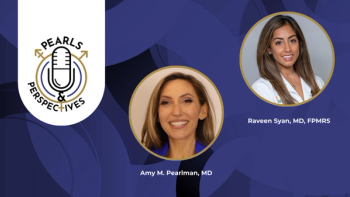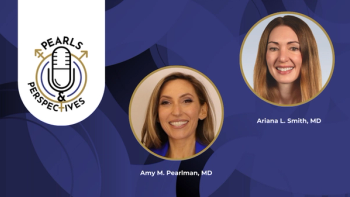
Navigating Safety Concerns and Adverse Effects in OAB Medications
In this episode, experts review safety concerns, drug interactions, and common adverse effects (AEs) associated with overactive bladder (OAB) medications. They discuss the impact of AEs like constipation, hypertension, and dry mouth on patient quality of life, strategies for managing these effects, and circumstances warranting a change in treatment. The experts also examine recent clinical evidence linking anti-cholinergic treatments to an increased risk of dementia in older patients, discussing its implications for clinical practice and strategies for urologists to remain vigilant about such safety concerns.
Episodes in this series

Transcript:
Dr Kennelly: It must be somewhere within as you both talked about side effects. So Dr. Benson, can you talk about side effects of the class of anti-muscarinic agents?
Dr Benson: Sure. Well, I think, you know, this class has been around the longest we've worked with at the most. So we have the best data. data and awareness of what it can pose. And I just tell patients this is really to begin with kind of a drying agent. So you may have dry eyes, dry mouth, you may have constipation, some of those classic side effects. I think the other issue is how bad are those side effects? Are they tolerable or not? Because for many they're mild and they can get by with them, but there are patients. patients who, within a day or two, are already not tolerating them. I think that the other big issue right now is the potential issue for dementia risk and is that going to be a bigger issue down the road. And for my patients, frankly, most are aware of this now. Many are reading about it in magazine articles or through blogs or different things. So when I ask about a medication, many will already know. bring up to me, well, I don't want the one that's going to cause me to get dementia, right? So they're self-selecting away from that right now.
Dr. Kennelly: What would be the mechanism of action? Why would this class have that?
Dr Benson: Sure, well, as an anti -muscarinic, it essentially affects mucus producing glands. And so it's going to lead to increased drying. and those things. I think one other thing is Dr. Eilber put in earlier, we really have to figure out what their goals are with these meds and are they looking to be totally dry? Are they looking to have a little more warning time? And so when I'm trying to figure out even medication used to begin with, I need to know what their goal is in how significant they want improvement because what most studies would show is you have more warning time. you may have some decreased urgent continence, but probably more in improvement in just the urgency and the frequency to a degree. And so I'm really looking for is what is this patient looking out of this before we frame the conversation?
Dr. Kennelly: And Dr. Eilber, do you have any other, what effects or adverse events do you see differences between the two classes of beta-3 agonist versus anti-muscarinic medicines?
Dr. Eilber: There is definitely not as much of the drying effects with the beta-3s. There should essentially be none, but you definitely have people say that some get affected. Having said that, sometimes the side effects, the anticholinergics, are beneficial. You have some people who have chronic diarrhea or other things, a little fecal incontinence. So, constipation them a little can actually help both their bladder and their GI issues.
Dr. Kennelly: So again, taking the whole picture in consideration, what other symptoms do you have? You know, because we know these have GI side effects, do you have any baseline GI symptoms?
Dr. Eilber: Certainly, someone who already constipated, it's probably not a good idea to give them the anticholinergics. I have not seen significant increase in blood pressure using you know, one of the beta 3 agonists, but that is another thing to consider. You know, and then the newer beta 3 agonists really essentially has no significant side effects, but the tradeoff is currently the insurance coverage is not great for a lot of people.
Dr. Kennelly: Right. And Dr Benson, I've noticed that within the American Urogynecologic Association and Society, they've actually put out sort of a white. paper specifically regarding these classes of medicines. And if I recall, they've stated that for women that are over the age of 70, the recommendation is not to use anti-muscarinics. Can you elaborate on that?
Dr Benson: Sure, that's correct. You know, and that's based on essentially emerging data that's looking at this as an age and a time-related exposure issue, right? So the longer you're on them and the older you are when you're on it probably the greater the risk and have essentially drawn a line in the sand with that age. I think still the things that I see first is that patients who may be in that high-risk group, many are on these meds coming to us. So some of these patients may have been on them for years and they may like them and that goes into consideration. I think the second issue is that cost consideration and the availability of coverage still often trumps what we may feel is the right way to go and so I can't tell you how many times we have the conversation as we're speaking right now and we get a phone call from the pharmacy 10 minutes after the patient's left and they've said well the patient wants to go with the generic you know anti -muscarinic because it's $500 less expensive. So, you know, as much as I absolutely believe the benefits of the beta-3 over the anti-muscarinics for this specific reason, it I'm still my hands are tied to a degree and what we do for the for that reason.
Dr Kennelly: Right.
*Video transcript is AI-generated and reviewed by Urology Times® editorial staff.
Newsletter
Stay current with the latest urology news and practice-changing insights — sign up now for the essential updates every urologist needs.






